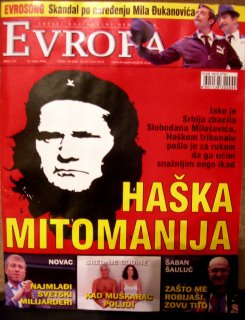 Several of my friends asked about were wondering why the media weren't describing the feelings of the people of Serbia as the funeral of Slobodan Milosevic nears. I can't answer the "why" question, but I've begun asking people I encounter about their feelings.
Several of my friends asked about were wondering why the media weren't describing the feelings of the people of Serbia as the funeral of Slobodan Milosevic nears. I can't answer the "why" question, but I've begun asking people I encounter about their feelings.My straw poll was nowhere close to being accurate. One woman at the television station where I'm working was walking around in a state of numbness. She explained that seeing all of the coverage of the former president's return reminded her of the worst of times living under his rule.
"Everyone has a particular moment in their memory that haunts them," she told me. Many people were very casual in their disinterest, but I really don't believe them. I'm beginning to believe that much of the population suffers from group post-traumatic stress disorder.
They lived through years of sanctions, they watched their loved ones go off to some unknown war and they lived through the bombs and missiles that turned large buildings into rubble. For many years they had believed in Milosevic. OK, he wasn't Tito, but he seemed to be taking the country in the right direction.
The people living outside of Belgrade were the fortunate ones in terms of getting information. Milosevic couldn't control the radio and TV signals throughout the rest of Yugoslavia, so the rural folks and small villagers were the first to realize something was wrong. Eventually they marched into Belgrade and convinced the big city people to join them in throwing the bum out.
The magazine cover above sums up how many people feel. They wanted a conviction -- a quick conviction, but the chief prosecutor at the Hague tribunal apparently wasn't interested in anything short of convicting Milosevic on every count. An early conviction on even one of the lessor counts, the article says, would have satisfied most of the people.
But because he died without being convicted of anything, he began his journey to a place in group memory alongside Che Guevara. Many people seem to feel cheated. A lot of folks were counting on revenge.
Instead, they see the man being treated like a national hero.
I'm hoping to watch his casket as it moves past the parliament building tomorrow and then I'm going to a rally near my hotel where hundreds are expected to converge and remind each other how much they despised Milosevic. I'll get some comments from the people I encounter.





No comments:
Post a Comment